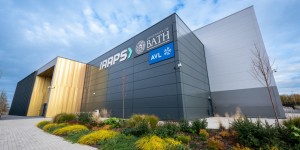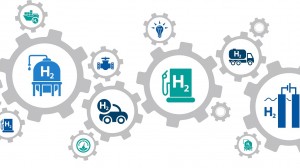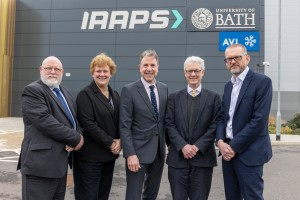Work has started on a hydrogen innovation centre on the outskirts of Bristol which will help put the West of England in the fast lane for research into alternative low carbon fuels.
The centre, which will be housed in the £70m Institute for Advanced Automotive Propulsion Systems (IAAPS) building on the Bristol and Bath Science Park at Emersons Green, pictured, is the latest in a string of projects aimed at providing state-of-the-art hydrogen research and development facilities for firms into hydrogen fuel.

It will aim to help tackle the research challenges blocking the commercial use of green hydrogen, focusing on transforming industries that are difficult to decarbonise such as transport, heating and steel which together make up about 90% of all UK greenhouse gas emissions.
Work on the hydrogen innovation centre is being funded by £1.7m secured from the government by the West of England Mayoral Combined Authority (WECA), which is also contributing £10m to IAAPS, which is operated by the the University of Bath.
The £1.7m will kit out the first floor of the IAAPS building with new office and innovation space for hydrogen firms and scientists to work together, alongside two fully-equipped hydrogen testing labs.
The centre will be the first of its kind in the region and, according to Metro Mayor Dan Norris, who leads WECA, will make the West of England one of the leading areas for hydrogen research nationally, carrying out crucial research on how to use this zero-emission fuel and progress towards a net zero economy.

It is also expected to bring tens of millions of pounds to the region as major businesses and finance firms look to invest in alternative fuels.
Construction work on the centre is expected to be completed by next spring and coincides with the development of a new liquid and cryogenic hydrogen plant at IAAPS which aims to play a vital role in the adopting sustainable fuels, including in areas such as aviation and marine transport that cannot easily use electric power.
Green hydrogen is made by splitting water by electrolysis using renewable power into hydrogen and oxygen.
The oxygen can be released into the atmosphere with no negative impact while the hydrogen can be used for clean heat and power – making it an ideal fuel to help meet the government’s net zero targets.

A number of British companies, including ITM Power, Johnson Matthey and Ceres Power, are already producing small amounts of green hydrogen – although most future plants are earmarked to open in coastal locations near offshore wind farms.
The University of Bath is key player in the national hydrogen research programme – UK-HyRES.
Mayor Norris, pictured, centre, with IAAPS and University of Bath representatives, said the hydrogen innovation centre will be one of the most modern facilities of its kind in the UK and would bring highly skilled jobs to the site, which is expected to employ up to 300 people when fully up and running.
“Hydrogen is clean, powerful and there’s lots of it,” he said. “That’s why I’m pleased to secure this bumper £1.7m cash injection to help make the West of England a leader when it comes to research in this zero-emission fuel.”
He said the move was testament to WECA’s strong track record of delivery and would put the region even more firmly on the map as a hydrogen leader.
“The UK’s brightest and best hydrogen thinkers and companies will all come together under one roof to figure out how we unlock the take up of hydrogen across all our industries – so very vital in hitting our ambitious net-zero targets locally,” he added.
University of Bath-based UK-HyRES director Prof Tim Mays said: “This major investment will provide infrastructure for world-class research and innovation in low carbon hydrogen, working together with industry, business and civic partners.”
Prof Chris Brace, executive director at IAAPS – which aims to be a global centre of excellence for motor industry research into next-generation ultra-low emission vehicles – added: “This investment allows us to establish a unique capability to support our industry partners, small and large, as they innovate in the hydrogen space.
“We can support them across the full range of activity – from basic research to new product introduction. This kind of integrated support is essential if we are to accelerate the introduction of this exciting new technology.”
Last December IAAPS launched a strategic partnership with aircraft parts manufacturer GKN Aerospace to develop and validate novel hydrogen technology to help decarbonisation the aviation industry.
IAAPS and its new hydrogen centres form the basis of a regional hydrogen and sustainable transport acceleration hub in the West of England, which is already positioning itself as the UK’s lead region for research into how the fuel can transform the economy – not just in transport but also for heating and powering homes, workplaces and public buildings.
More than 30 cross-sector partners are already involved in looking at how hydrogen can stimulate green growth in the region while also providing a vital link to the national hydrogen research infrastructure.





























